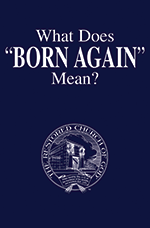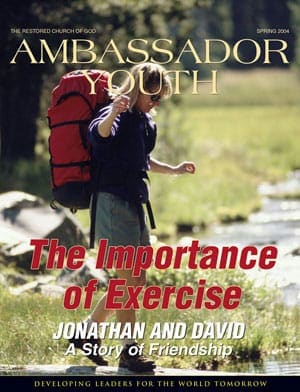Everyone occasionally says the wrong thing to the wrong person at the wrong time. “Why did I say that?” or “Oh, I just didn’t think it through,” are common afterthoughts. Another typical reflection after such an awkward situation is “If only I had a chance to do this all over again, I think I could get it right, this time.”
What characteristic could help one avoid the pitfalls of insulting, embarrassing or agitating someone else, especially when this is not the intent? What trait could prompt us to look ahead, spot potential trouble, and take measures to avoid it? Practicing the principles of discretion and prudence can keep you out of such awkward situations.
But what are discretion and prudence? What do they mean? God’s Word reveals much about these two qualities—and it sheds light on how you can exercise them in your life!
The dictionary definition of discretion begins with “the quality of being discreet.” And to be discreet means to be “wise or judicious in avoiding mistakes or faults; prudent; circumspect; cautious; not rash.” In other words, discretion is exercising judgment tempered with these attributes in order to arrive at a final decision or outcome.
Prudence means “cautious, practical wisdom; good judgment; discretion; exercising caution in preparing for the future in a judicious manner.” (Take time to look up the word judicious, as well.) Notice that the definitions of these terms are virtually the same, and that they are defined in terms of each other.
As you study this lesson, open your Bible and look up each scripture. Writing out the verses will help you make wisdom and instruction a part of your thinking. This is especially true when you review these notes from time to time.
(1) What are some of the main benefits of having discretion? Proverbs 2:11-12.
The fact that discretion will preserve you (vs. 11) makes it a precious commodity. Verse 12 shows one of the things that discretion will deliver you from: The way of an evil man who speaks foul language. Verses 15 to 19 show that such a man walks in darkness and delights in wickedness. One who has discretion has the courage and resolve to stand up to such a person, and insist, “No, the direction in which you are headed in life is not the path that I choose to follow.” All too often, aimlessly following the crowd results in permanent injury or death. Group mentality often borders on mob mentality—especially among youth who seek the approval of their peers.
Think of discretion as guardrails on each side of the road, keeping one from plummeting off a dangerous embankment to an untimely death. Better yet, compare it to a blinking light cautioning that a bridge is out or that the road is obstructed. Discretion can be your internal warning system that serious potential danger is just ahead.
(2) Can one acquire discretion by merely asking for it—or does it require sustained effort? Proverbs 2:1-6.
After writing out these verses, go back and highlight certain words. These words are action verbs. This means that effort is required in order to attain wisdom and understanding. Each of the following underlined words should be highlighted in your notes.
In verse 1, you are to (eagerly) “receive” God’s words and to “hide [His] commandments with you” (in the recesses of your mind as something worth treasuring). Verse 2: You “incline your ear to wisdom and apply your heart to understanding.” Verse 3: You “cry after knowledge and lift up your voice for understanding.” Verse 4: You “seek [wisdom, knowledge, understanding] as silver and search for [it] as hid treasure.” Those who search for hidden treasure will thrive upon the excitement and hope of finding it. Verses 5 and 6 show that if you put forth all this effort, “then you shall understand the fear of the LORD and find the knowledge of God. For the LORD gives wisdom and out of His mouth comes understanding.”
Through all of this effort, discretion is so well established in the mind that it acts as a preserver—a shield or bodyguard.
(3) What are some other benefits of exercising discretion? Psalm 112:5; Proverbs 19:11.
For someone to “guide his affairs with discretion” means to do so according to God’s will. This results in long-term blessings! For one’s discretion to cause him to “defer his anger” shows that it provides the means of self-control—something sadly lacking in today’s world.
It is interesting that mezimmah, the Hebrew term translated in the King James Version (KJV) as “discretion,” is simply translated “good sense” in the Moffatt Translation. In other words, the above scriptures address how we can guide all our affairs, or conduct all our business, based on good sense. You have probably heard your parents say things like “You need to have the good sense to know when to keep silent” or “You need the good sense to know when to stop.” Guess what? Your parents were actually teaching you about DISCRETION!
(4) What are some of the benefits of exercising prudence? Proverbs 15:5; 12:16; 22:3; 27:12.
Proverbs 15:5 summarizes why many youth today have self-destructed. They have rejected advice and reproof from their parents—especially the father. Does God side with today’s approach of letting young people run their own lives? Never! Notice: “The fool despises his father’s instruction, but he that regards reproof [listens] is prudent.”
As we see in Proverbs 12:16, prudence also helps one to practice self-control. For a prudent man to cover shame, he has to be able to control and to suppress his own wrath and anger.
By now, you have probably observed that Proverbs 22:3 and 27:12 are one and the same. This verse appears twice in the book of Proverbs for special emphasis. The KJV reads, “A prudent man foresees the evil and hides himself, but the simple pass on and are punished.”
The Moffatt translation renders it this way: “A cautious man sees danger and takes cover: the simpleton strolls on—and pays for it.”
Deeply ponder all the many applications of this verse. As you grow to adulthood, this will serve to keep you away from untold trouble, anguish, suffering and regret. Practicing this will train you to look ahead and ponder what could potentially go wrong with certain plans. To have this foresight, and to exercise it with godly wisdom, is a precious attribute.
The phrase at the end of the KJV translation, “and hides himself,” does not necessarily mean to “run and hide.” It can mean that the man who foresees the evil is able to take some form of preventative action, such as replacing worn out tires with new ones to insure safety. It might include an evasive action, such as an aircraft flying above or around storm clouds instead of following the original charted course that would have taken it directly into the storm.
We can apply this scripture to every goal we have in life. We have to be alert to adopt new strategies and alter the course whenever we see potential dangers or pitfalls. Exercising caution in this way is practicing both discretion and prudence.
There are three more verses in Proverbs with which you should be very familiar. Knowing and pondering them will help you practice discretion and prudence. Think carefully about their meaning. The verses are Proverbs 4:25-27:
“Let your eyes look right on, and let your eyelids look straight before you.
“Ponder the path of your feet, and let all your ways be established.
“Turn not to the right hand nor to the left: remove your foot from evil.”
You need to write these verses in your notes, as well. There are many other aspects of discretion, such as decorum (propriety of conduct, speech, dress, etc.), that we were not able to address in this short Bible study. Yet, the things we did cover are so vital in living God’s way of life and enduring to the time that His government is set up on earth.


















